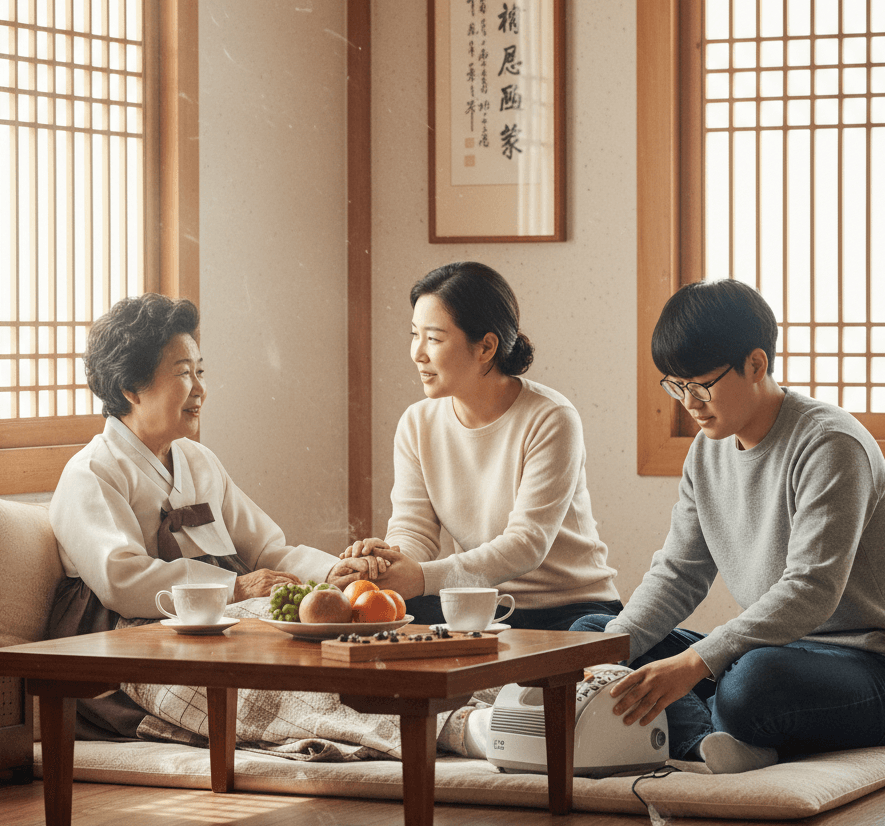In Korean culture and many others, caring for elders is considered both a duty and an expression of love. But as life becomes faster and families juggle work, children, and other commitments, providing quality home care for aging parents or grandparents can be challenging. Still, with the right mindset, organization, and understanding of elders’ physical and emotional needs, families can create a supportive, healthy, and dignified environment at home.
Here’s how families can enhance home care and ensure that older loved ones live with comfort, respect, and happiness.
➤ 1. Prioritize Communication and Emotional Connection
The most essential part of elder care is listening and connection. Many seniors experience loneliness or emotional isolation, especially when their mobility or social activities decrease. Family members can make a huge difference simply by being present and attentive.
Ways to improve emotional care:
- Talk with elders daily, even briefly, to make them feel valued.
- Encourage them to share stories, memories, or advice—this keeps their minds active.
- Involve them in family decisions when possible, preserving their sense of independence and dignity.
- Use affectionate gestures—smiles, touch, or words of appreciation—to strengthen emotional bonds.
Feeling loved and respected has been linked to better mental health, memory, and even physical resilience in older adults.
➤ 2. Create a Safe and Comfortable Living Environment
Safety is crucial when elders live at home. Small modifications can prevent falls and injuries, which are among the most common risks for aging adults.
Practical home care adjustments:
- Install non-slip mats in bathrooms and kitchens.
- Keep walkways clear of clutter and ensure adequate lighting.
- Use grab bars near toilets, showers, and stairs.
- Choose comfortable furniture with firm cushions that make it easy to sit and stand.
- Arrange commonly used items—glasses, medicine, clothing—within easy reach to reduce strain.
Families can also consider home monitoring devices that alert caregivers in case of accidents, or simple call buttons for emergencies. These small upgrades give both elders and their families peace of mind.
➤ 3. Support Healthy Nutrition and Hydration
Diet plays a major role in maintaining vitality in old age. Korean nutritionists often emphasize balanced, warm meals with plenty of vegetables, soups, and fermented foods that promote digestion and immunity.
Home care nutrition tips:
- Prepare easy-to-chew meals using soft vegetables, tofu, fish, or grains.
- Include fermented foods like kimchi, soybean paste, or yogurt for gut health.
- Offer small, frequent meals rather than large portions to support metabolism.
- Encourage regular hydration with water, barley tea, or mild herbal teas.
- Limit overly salty or spicy foods, which can raise blood pressure or irritate the stomach.
Whenever possible, involve elders in meal planning or light cooking. It helps them feel included and keeps their minds and hands active.
➤ 4. Encourage Gentle Physical Activity
Regular movement keeps muscles strong and joints flexible, reducing pain and fatigue. Even low-impact exercise can dramatically improve balance, circulation, and mood.
Safe and simple activities include:
- Morning stretching or yoga for flexibility.
- Walking around the house or garden several times a day.
- Chair-based exercises for those with limited mobility.
- Light household chores or gardening for physical and emotional satisfaction.
Families can make exercise more enjoyable by joining in. A daily walk or stretching session together builds connection and encourages consistency.
➤ 5. Support Cognitive and Mental Health
Maintaining mental sharpness is as important as physical health. Mental decline often accelerates when seniors feel bored or disconnected, but stimulation and purpose can delay or reduce such decline.
Tips for cognitive engagement:
- Encourage reading, puzzles, or brain games.
- Play familiar music or songs—they often trigger positive emotions and memories.
- Involve elders in hobbies like knitting, painting, or simple crafts.
- Use conversations to recall family history or meaningful life events.
Emotional well-being matters just as much. Offer praise, patience, and reassurance. Depression and anxiety can go unnoticed in elders, so regular emotional check-ins are vital.
➤ 6. Manage Medication and Healthcare Routines
Elderly care at home often includes managing medications, medical appointments, and health monitoring. Families should create a clear routine and tracking system to avoid mistakes.
Steps to ensure safe medication management:
- Keep all prescriptions organized in a labeled pillbox.
- Set alarms or reminders for medicine times.
- Keep a written record of medications, dosages, and doctor contacts.
- Regularly review medications with a pharmacist or doctor to avoid interactions.
- Encourage routine check-ups for blood pressure, blood sugar, and overall wellness.
If mobility is an issue, consider home visit nurses or telemedicine—many clinics in Korea now offer remote consultations for convenience.
➤ 7. Balance Independence with Support
One of the biggest challenges in elder care is maintaining the right balance between helping and empowering. Too much control can make elders feel dependent, while too little can lead to accidents or neglect.
Encourage independence where possible—let them choose their clothes, decide what to eat, or perform light tasks. Offer assistance only when necessary, and always ask before acting to maintain their dignity.
Supporting independence not only boosts confidence but also helps preserve motor skills and cognitive function.
➤ 8. Build a Family Care Routine
Caring for elders should never fall on one person alone. A shared family plan ensures consistent attention and prevents caregiver burnout.
How to organize care effectively:
- Divide responsibilities among family members—one handles meals, another manages appointments, another offers companionship.
- Create a weekly schedule that includes rest time for each caregiver.
- Consider professional support, such as part-time caregivers or visiting nurses, when needed.
- Hold short family meetings to update on the elder’s health and emotional state.
Consistency builds trust and stability for both the elder and the family.
➤ 9. Address Emotional Challenges and Caregiver Stress
Caring for aging loved ones can be emotionally demanding. It’s important for family members to recognize their own needs too. Burnout can affect patience and compassion, so caregivers must also practice self-care.
Ways to prevent burnout:
- Take regular breaks and rest days.
- Seek emotional support from other family members or local caregiver groups.
- Maintain healthy boundaries and communication.
- Remember that asking for help is a sign of responsibility, not failure.
A healthy, supported caregiver can provide far better care to their loved ones.
➤ 10. Make Home a Place of Joy and Purpose
Beyond medical and physical needs, elders thrive in an environment filled with warmth, respect, and purpose. Encourage them to participate in family celebrations, small chores, or hobbies they enjoy.
Keep the home atmosphere cheerful—display family photos, play calming music, and celebrate small achievements. These positive cues remind them that they remain a valued part of the family, not just someone being cared for.
➤ Conclusion
Providing home care for elders is not only about meeting physical needs—it’s about nurturing connection, dignity, and happiness. By combining practical care with emotional support, families can create an environment where aging loved ones feel safe, respected, and loved.
The Korean approach to elder care emphasizes balance, warmth, and community—values that every family can apply. When families work together to provide thoughtful, compassionate care, they build a home filled with harmony across generations.













